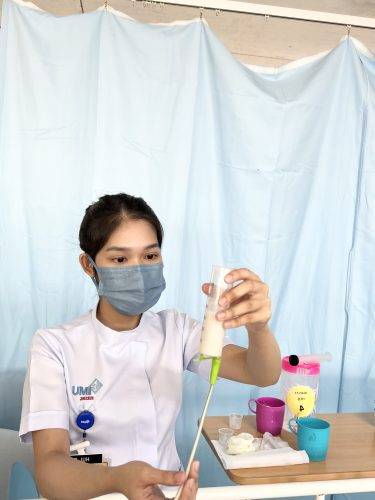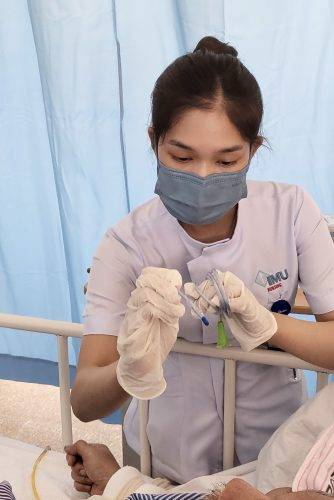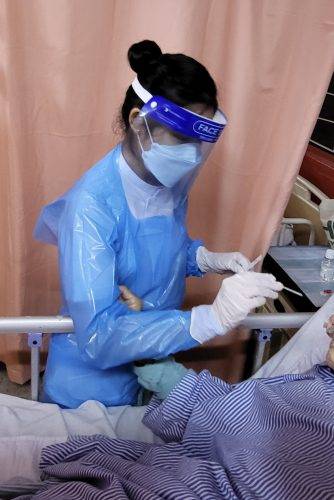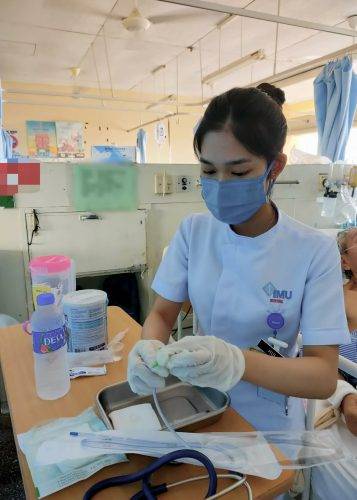My name is Ah Hui Gi, an IMU nursing student from cohort NU120. I just finished my two months clinical posting at Hospital Tuanku Ja’afar Seremban in Negeri Sembilan (HTJS). In order to achieve our learning outcomes for Semester 4, I was posted to various medical and surgical wards. Additionally, I had the opportunity to visit many departments, including the Diabetic Centre, the Dialysis Clinic, and the Plaster Room, where Plaster of Paris (POP) was used to immobilise broken body parts.
Despite being assigned to a new department in the Hospital Tuanku Ja’afar Seremban, we were eager for the new experiences and challenges that were ahead of us. Due to the large number of patients who were constantly arriving for follow-up visits, we were kept busy throughout our shift. Despite that the welcoming and friendly patients at the hospital kept us motivated every day. We also had abundance of opportunity to perform health examinations and learn new procedures.
When I reflected on the period that I spent at HTJS, I realised how valuable the clinical learning experiences were for my learning and how it further reaffirmed my decision to be in the nursing profession.

Each clinical attachment I undergo each semester provided me with fresh perspectives on the nursing profession and its contribution to the society. The value of emotional support that a nurse can provide in nursing practise is the most valuable lesson that I’ve specifically learnt from this experience.

The idea of a therapeutic nurse-patient relationship and holistic nursing care, in which each patient should be treated as a whole, have been ingrained in me since the beginning of the course.

When I reflected on my previous clinical attachments, I realised that I didn’t really practise providing emotional support to patients and family members because I didn’t truly understand its significance to the healing process. However, this clinical placement allowed me to gain a lot of hands-on experience, and it was wonderful since it allowed me to perform various nursing procedures on actual patients in real situations. Hence, personally I found this clinical posting to be truly rewarding and an amazing clinical experience!
I’d like to share an experience I had on the last day of my attachment of clinical posting, when I was taking care of a 74-year-old woman who had bullous pemphigoid. This experience completely changed the way I perceived life. On that day, I could see lesions and blisters all over the patients’ body, including on the scalp and lips of the patient. The painful effects of the lesions made it difficult for the patient to walk, sit, or rest on the bed. I accompanied her to the outpatient clinic treatment room for her potassium permanganate bath. I was shocked when the patient left the room crying.
At that time, I was desperately thinking of a way to console her as I brought her to the consultation room for the doctor to review. I offered her tissues and held her hand since I couldn’t think of a better way to express my empathy. It was a very shocking moment for me when she said, “I would rather die than suffer.” I was at a loss for words. I did everything I could to distract her and make her feel better. The patient finally began to smile when she talked about her grandchildren. When we returned to the ward, she kissed my hand and said, “I’m so glad you’re here, thank you so much!”. I was so touched and will always remember that moment.
It is a privilege to be able to care for patients at the time when they are most in need, particularly during current pandemic, when visiting hours have been prohibited and most family members are unable to come and visit. Sometimes, patients only want to be heard, and all it takes to help them is to acknowledge their emotions, carefully listen to them without passing judgement, offer support, and simply be there for them. Therefore, at that time, therapeutic nurse-patient relationship is most needed as part of ensuring high quality nursing care other than to develop mutual respect and trust between a nurse and a patient.

Undoubtedly, this inspiration is attributed by my clinical instructors who have consistently encouraged us to examine the patient holistically and from various perspective, including physiological, emotional, social, economic, and lifestyle of the patients. Not only that, when planning nursing care, the patient’s family must also be taken into consideration as patient support from caring caregivers may also inspire the patient to persevere and continue with their treatment.
On that day, I truly believe that nurses can help improve and save patients live. I’ve gained valuable knowledge from this clinical posting, including the importance of being an active member of a healthcare team to establish an effective professional relationship. I know that nurses do not work alone but instead should work together with other healthcare personnel towards achieving good patient outcome. Establishing effective communication is vital, especially for me as a nursing student. I should always seek clarification or assistance if I am uncertain when carrying out any tasks assigned to me.
Even though it was a tiresome journey filled with laughter and tears, I have never regretted the decision I made to join the IMU nursing programme. I’m also feeling grateful to have cared for patients from various backgrounds and for their life lessons shared with me. It is gratifying to see them free from suffering and recovering from illness. Their trust in my ability to perform procedures on them and their appreciation have been my biggest motivation.
Written By Ah Hui Gi (Bachelor of Nursing (Hons), Year 2 Semester 4)
Reviewed by Azaria & Dr Lim Swee Geok


No approved comments.